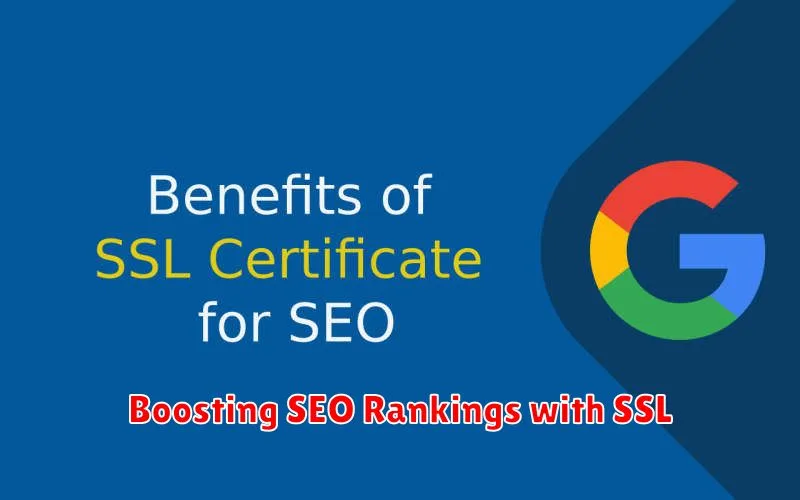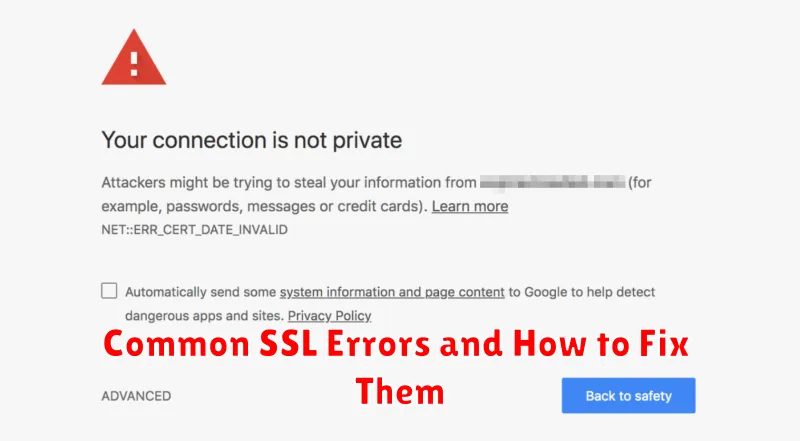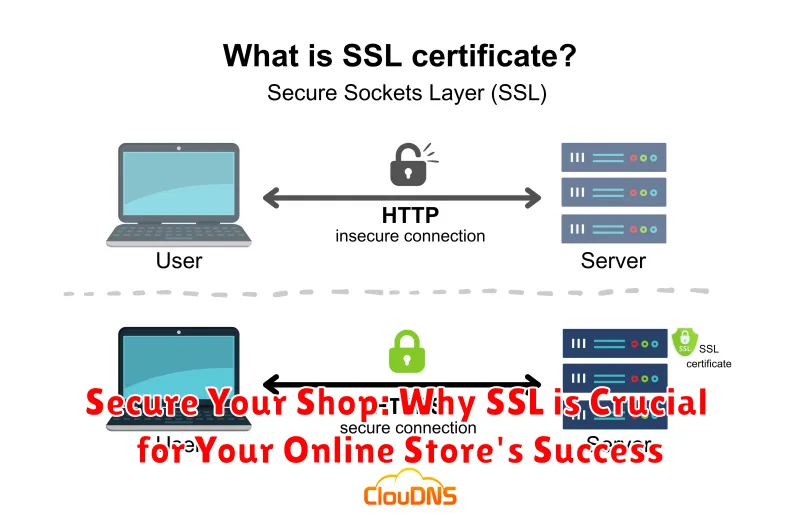In today’s digital marketplace, ensuring the security of your online store is paramount to its success. Customers are increasingly aware of online threats and prioritize shopping on secure platforms. This is where SSL (Secure Sockets Layer), now more accurately known as TLS (Transport Layer Security), becomes absolutely crucial. Implementing an SSL certificate on your e-commerce website is no longer a luxury, but a necessity for building trust, protecting sensitive data, and ultimately, driving sales. A visible SSL certificate, indicated by the padlock icon and the “https” in the address bar, provides immediate visual reassurance to your customers that their information is safe within your online store.
This article will delve into the importance of SSL for your online store’s success. We will explore how SSL certificates work to secure connections, encrypt sensitive customer information like credit card details and personal data, and protect against cyber threats such as phishing and data breaches. We will also discuss the positive impact of SSL on SEO (Search Engine Optimization) and how it contributes to building a secure and trustworthy brand image for your online store, ultimately leading to increased customer confidence and improved conversion rates. Learn why having a secure website with an SSL certificate is crucial for attracting and retaining customers in today’s competitive e-commerce landscape.
Understanding SSL and Its Importance
SSL (Secure Sockets Layer), or its modern successor TLS (Transport Layer Security), is the foundation of online security. It’s a cryptographic protocol that establishes an encrypted connection between a web server and a user’s browser.
This secure connection ensures that all data transmitted between the server and the browser remains private and integral. Without SSL, information sent over the internet, such as credit card details, login credentials, and personal information, is vulnerable to interception and theft by malicious actors.
In essence, SSL acts as a digital lock, safeguarding sensitive data as it travels across the network. This encryption is crucial for building trust with customers and ensuring the security of online transactions.
The Benefits of SSL for Online Stores
Implementing SSL provides numerous advantages for online businesses. A primary benefit is the enhanced security it offers. SSL encrypts sensitive data transmitted between the customer’s browser and the server, safeguarding information like credit card details, addresses, and login credentials from cybercriminals.
Beyond security, SSL also plays a vital role in building customer trust. The padlock icon in the address bar and the “https” prefix visually communicate a secure connection, reassuring customers that their information is safe. This increased trust can lead to higher conversion rates and improved brand reputation.
PCI DSS compliance is another key benefit. The Payment Card Industry Data Security Standard mandates SSL for all websites that process credit card transactions. By implementing SSL, online stores demonstrate their commitment to secure payment processing and avoid potential penalties.
How SSL Builds Trust and Credibility
In the digital marketplace, trust is paramount. Customers are understandably wary of sharing sensitive information online, especially payment details. An SSL certificate acts as a powerful trust signal, visually assuring visitors that your website is secure.
The presence of the padlock icon in the address bar and the “https” prefix signify a secure connection, indicating to customers that their data is encrypted and protected from interception. This visual cue builds confidence and encourages them to proceed with transactions.
Furthermore, SSL certificates are often accompanied by security seals displayed on the website. These seals, issued by reputable certificate authorities, further validate your website’s security and enhance customer trust. By visibly demonstrating your commitment to security, you foster a sense of credibility and professionalism, ultimately increasing customer confidence and conversions.
Protecting Customer Data with SSL Encryption
At the heart of SSL’s functionality lies its ability to encrypt sensitive customer data. This encryption process transforms readable information into an unreadable format, preventing unauthorized access.
When a customer interacts with your online store, various types of data are transmitted, including:
- Personal Information: Names, addresses, phone numbers, and email addresses.
- Financial Data: Credit card numbers, bank account details, and payment information.
- Login Credentials: Usernames and passwords used to access customer accounts.
SSL encryption ensures that this data remains confidential while in transit between the customer’s browser and your server. Should a malicious actor intercept this data, they would only encounter an indecipherable string of characters, rendering the stolen information useless.
This protection is crucial for maintaining customer trust and adhering to data privacy regulations.
Boosting SEO Rankings with SSL

Search engines like Google prioritize websites that provide a secure browsing experience for their users. Since 2014, Google has officially confirmed that SSL is a ranking factor. While not a massive ranking boost on its own, implementing SSL contributes to a better overall SEO profile. This means that securing your website with SSL can give you a competitive edge in search results.
Having an SSL certificate signals to search engines that your website is trustworthy and committed to user security. This positive signal can improve your site’s visibility in search results, potentially leading to increased organic traffic. In a competitive online landscape, even a small improvement in search ranking can significantly impact your bottom line.
Furthermore, SSL enhances user experience by providing a sense of security, which can indirectly influence SEO. When visitors feel safe on your site, they are more likely to stay longer, explore more pages, and ultimately convert. These positive user signals, such as reduced bounce rates and increased time on site, can also contribute to higher search rankings.
Choosing the Right SSL Certificate for Your Store
Selecting the appropriate SSL certificate is crucial for establishing trust and ensuring the security of your online store. Several factors should be considered when making this decision.
Validation Level: This refers to the level of identity verification performed by the Certificate Authority (CA). Domain Validation (DV) SSL certificates offer the quickest and most basic validation, verifying only ownership of the domain. Organization Validation (OV) SSL certificates provide a higher level of assurance by verifying the legitimacy of your business. Extended Validation (EV) SSL certificates offer the highest level of authentication, displaying your organization’s name in the browser’s address bar, fostering the strongest sense of trust.
Number of Domains: If you operate multiple subdomains or websites, consider a wildcard certificate to secure all subdomains under a single domain or a multi-domain certificate to secure multiple distinct domain names.
Installing and Maintaining SSL Certificates
Installing an SSL certificate involves several key steps. First, you’ll need to generate a Certificate Signing Request (CSR) on your server. This request contains information about your website and your organization. Once generated, submit the CSR to a Certificate Authority (CA). After verification, the CA will issue your SSL certificate.
The next step is installing the certificate on your web server. The exact process varies depending on your server software (Apache, Nginx, etc.), but generally involves uploading the certificate files and configuring your server to use them.
Maintaining your SSL certificate primarily involves renewal. Certificates typically expire after one or two years. Before expiration, you’ll need to generate a new CSR and go through the issuance process again. Set reminders to avoid service interruptions. Regularly check your server logs for any certificate-related errors.
Common SSL Errors and How to Fix Them

Encountering SSL errors can be frustrating for both you and your customers. Addressing these issues promptly is crucial for maintaining trust and a seamless shopping experience. Here are some common SSL errors and troubleshooting steps:
“Not Secure” Warning
This warning often indicates an issue with the SSL certificate installation or configuration. Double-check that the certificate is properly installed and that all resources on your site (images, scripts, etc.) are loaded over HTTPS.
Certificate Name Mismatch
This error occurs when the domain name on the certificate doesn’t match the actual domain name being accessed. Ensure your certificate covers the correct domain and any subdomains. Consider a wildcard certificate if needed.
Expired Certificate
An expired certificate renders your site insecure. Renew your SSL certificate before its expiration date to avoid disruptions.
Mixed Content Errors
These errors appear when some elements on your HTTPS site are loaded over HTTP. Identify and update all links, scripts, and resources to use HTTPS.

